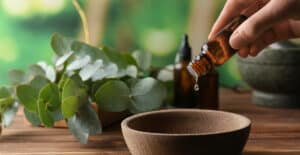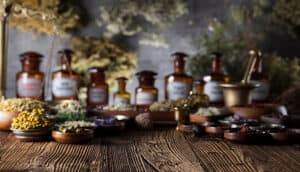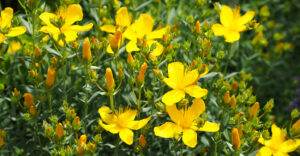The heart is the sustainer of life. All bodily functions are synchronized to the electromagnetic rhythm of the heart. It brings vital blood and oxygen to the body so the cells and organs may function properly. It is the great conductor, the first mode of perception, and the seat of intuition.
Heart disease is the number one cause of death in the United States. Given this information, it’s essential to understand heart health and to take steps to increase the health and longevity of the heart. Because heart disease occurs after years and years of damage to the arteries and heart muscle, prevention starts now.
There are several ways to prevent heart disease and strengthen and nourish the heart*. Lifestyle factors, such as diet and stress management, are the first and most important to consider. Along with lifestyle improvements, medicinal herbs can significantly support the heart and the entirety of the cardiovascular system.
*Although there are many steps we can take to prevent heart disease and increase the resilience of the heart, it’s important to note that some heart conditions are hereditary and may be difficult to impossible to prevent. That said, I believe in the power of faith and miraculous healing, and hereditary heart conditions shouldn’t stop anyone from taking their heart health seriously and doing what they can to protect and strengthen the heart.
Heart Healing Lifestyle
Exercise and a healthy diet are some of the best ways to support your heart. Regular exercise that raises your heartbeat, at least 30 minutes a day for most days of the week, significantly increases the strength of the cardiovascular system. I know from firsthand experience it’s a lot easier said than done when it comes to regular exercise, which is why I recommend finding movement that resonates with you. Variety is key for me, and I enjoy hiking, dancing, gardening, farm work, yoga, short sprints (usually out on a walk), and rock climbing.
If you can find a way to make exercise enjoyable, such as an activity you do with a friend or partner, it’s much easier to stick to a routine.
A whole article could be written on heart-healing foods and the damaging effects of very fatty foods, which is why I will not go into detail on those here. I will leave it at this: avoid highly processed and fried foods and ensure your diet includes antioxidant-rich foods (berries, vegetables) and soluble fiber (oats, beans, vegetables). There is a plethora of information on foods that benefit the cardiovascular system and foods that don’t. I highly suggest researching that information, as food is our first and primary medicine.
Lastly, there are specific lifestyle factors that greatly increase the risk of heart disease, including excessive smoking (both cigarettes and cannabis), excess alcohol consumption, and prolonged nervous system imbalance (stress leading to high blood pressure). All of these factors are within one’s control to address, but that doesn’t mean these are easy things to change. Most often, these are addictive behaviors hard-wired into one’s consciousness. Sustainable change and healing require a willingness to address these behaviors and the courage to seek their root causes.
Herbal Categories for Heart Health
When considering healing herbs for the heart, it’s helpful to learn the herbal categories specific to the heart and cardiovascular system. The main term for these herbs is cardiac remedies, and within this broad category are a few subcategories that further explain the specific effect on the cardiovascular system.
Cardio Tonics
The most important herbal category for heart health is cardio tonics/cardiovascular tonics. As the name implies, these herbs tone, strengthen, and rejuvenate the cardiovascular system. These remedies restore the tissues and increase the function of the entire system. Cardio tonics are the top herbs for preventative care and for building the integrity of the cardiovascular system over a period of time.
Cardiovascular Tonics:
- Hawthorn (Crataegus spp.)
- Linden (Tilia platyphyllos)
- Garlic (Allium sativum)
- Motherwort (Leonurus cardiaca)
- Yarrow (Achillea millefolium)
Cardioactive Herbs
Cardioactive remedies are a powerful category of herbs that contain a highly active substance known as cardiac glycosides. This chemical compound improves the efficiency of the heart muscle without increasing its need for oxygen. This enables the heart to pump adequate amounts of blood around the body and ensures no fluid builds up in the lungs and extremities (Hoffman, 168).
This life-saving compound is in pharmaceutical drugs for congestive heart failure, such as digitoxin. This drug is named after foxglove (Digitalis spp.), a plant from which the cardiac glycosides are derived. However, this active substance is found in several other plants as well and isn’t always specifically extracted from foxglove.
While this is an important herbal action to be aware of, the home or folk herbalist should never administer or work with cardiac glycoside-containing plants unless they have been specifically trained to work with this powerful substance. This is because it’s hard for the body to remove cardiac glycosides, which creates the risk of it building up within the body. High levels of cardiac glycosides in the blood leads to poisoning, which is why plants such as foxglove are considered poisonous.
“As dramatically effective as they are, the key to safe and successful therapeutic application is skilled diagnosis and interpretation, as well as regular monitoring for levels of cardiac glycosides in the blood. Without this skill, these plants are extremely poisonous.”
- David Hoffman, Medical Herbalism: The Science and Practice of Herbal Medicine
For the home or folk herbalist without medical training, cardio tonics and the herbal actions below are the main herbal categories to work with for heart health.
Nervine Relaxants and Trophorestoratives
While there are nerves throughout the entire body, there are specific areas with a large concentration of neural tissue, including the brain, heart, and gut. Herbal nervines that have an affinity for the neural tissue of the heart are incredibly important remedies to consider.
Stress and anxiety negatively impact the heart by increasing blood pressure and possible heart palpitations. These herbs help calm the entire nervous system and the neural tissue of the heart, helping to lower high blood pressure and ease anxiety/stress that manifests as tension in the chest. Those who experience stress/anxiety the most in their chest are at an increased risk for hypertension and heart disease if that stress continues over several years.
Relaxant herbs that calm the central nervous system, help alleviate stress, and have an affinity for the neural tissue of the heart include motherwort, linden, hawthorn, valerian, and rose.
Circulatory Stimulants
Circulatory stimulants are warming herbs that increase blood flow, supporting tissue oxygenation and waste elimination. These remedies increase and strengthen circulation, which is beneficial for circulation problems and strengthening the cardiovascular system as a whole.
Circulatory Stimulants:
- Garlic (Allium sativum)
- Ginger (Zingiber officinale)
- Cayenne (Capsicum annuum)
- Rosemary (Rosmarinus officinalis)
- Prickly Ash (Zanthoxylum americanum)
- Yarrow (Achillea millefolium)
Bitters
Bitters are well known for their beneficial effects on digestion, as they increase bile secretion and improve the overall function of the liver, gallbladder, stomach, and small and large intestines.
However, emerging research finds that bitters also affect other systems of the body, including the immune and cardiovascular systems. This is because we have bitter receptors throughout our body, including the heart and blood vessels. Whenever we taste bitterness, we stimulate these receptors. When these receptors are stimulated, they increase bodily functions, such as digestion, immunity, and the cardiovascular system. Research is finding that bitters are cardioprotective, helping to strengthen the heart as a whole and regulate the rhythmic heartbeat.
Given that motherwort (Leonurus cardiaca) is both a cardiotonic and bitter, it is of increased value as a heart-healing remedy. Plus, its bitter properties point to how it helps support the heart.
Heart Healing Herbs
Now let’s get to the good stuff – specific herbal remedies for strengthening, protecting, and nourishing the heart.
Hawthorn (Crataegus spp.)
Parts Used: Flower, Leaf, and Berry
Medicinal Actions:
- Astringent
- Antioxidant
- Cardiotonic
- Digestive support
- Nervine
- Vasodilator
Hawthorn is the primary cardiovascular remedy in Western herbalism, as it has a profound strengthening, nourishing, and rejuvenating effect on the heart. It is indicated not only for preventing heart disease but also for any heart condition, including congestive heart failure (CHF), hypertension (high blood pressure), low blood pressure, coronary heart disease, atherosclerosis, and heart arrhythmias. In this way, hawthorn has a balancing effect on the cardiovascular system and can promote healing in whichever direction is needed. In this way, hawthorn is like an adaptogen for the cardiovascular system, which is another way of describing a tonic remedy.
The leaves, flowers, and berries are used for strengthening the cardiovascular system. While the berries are the traditional part used for heart conditions, the leaves and flowers add value because they are rich in antioxidants and help lower blood pressure. I also find the flowers work on the emotional level and are indicated for a grieving or heartbroken heart.
Hawthorn works by relaxing the tissues of the blood vessels. By relaxing these tissues, it allows the vessel to widen, which creates more easeful blood flow and ultimately less pressure (hypertensive). Interestingly, hawthorn not only relaxes the tissues of the blood vessel walls but also strengthens and tonifies the walls – which is seemingly paradoxical. In this way, it enhances the integrity of the entire structure and will bring balance whether there’s high blood pressure or low blood pressure. Through these same actions, it improves the elasticity of the arteries, preventing arteriosclerosis or the thickening and hardening of the arterial walls (Popham, 2018).
Another way hawthorn prevents arteriosclerosis is by lowering LDL (low-density lipoprotein) cholesterol. This is the type of cholesterol that can build up in the arteries and aorta, causing thickening and hardening to the arterial walls and increasing the risk of heart attack, hypertension, and other conditions. It not only decreases LDL but also increases HDL (high-density lipoprotein) cholesterol, which helps remove fat from the bloodstream and liver.
One of the amazing benefits of hawthorn is its affinity for coronary circulation, which is the heart’s own circulatory system (the blood that flows within the heart itself). It strengthens and tonifies the coronary arteries, which increases the amount of oxygen to the heart muscle. Lack of oxygen in the heart leads to angina (chest pain), making hawthorn a valuable remedy for angina and helping to prevent coronary heart disease.
Furthermore, hawthorn has a direct strengthening, nourishing, and tonifying effect on the cells and muscle (myocardium) of the heart. This leads to more efficient and stronger contractions, which support a balanced and regular heartbeat, leading to adequate blood flow throughout the body. Thus, hawthorn is indicated for several conditions that are a result of any weakness in the heart or cardiac arrhythmia (irregular heartbeat).
Through hawthorn’s powerful antioxidant compounds found in the flavanone-rich berries, leaves, and flowers, it protects the vasculature from oxidative stress and inflammation and helps prevent the formation of arterial plaque.
As a cardiotonic, hawthorn provides the best results from consistent use over a long period of time. Because of this, hawthorn is a safe and gentle remedy* that can be used for several months or years without causing any side effects or imbalances.
I find that the easiest way to incorporate hawthorn into everyday life is through taking the tincture. This is especially true for the berries, which require a long decoction for their medicine to be extracted via water. Alcohol, on the other hand, effectively extracts the medicinal constituents of hawthorn berries. That said, hawthorn leaves and flowers are wonderful in a tea (infusion) and lend their medicinal constituents freely to hot water, making them a lovely addition to a daily tea blend.
*Use caution when using hawthorn alongside heart medications, especially blood pressure medications or heart failure medications such as digitoxin. Speak with a trusted healthcare provider or qualified herbalist to make sure hawthorn is safe for use if you are on any medications.
Motherwort (Leonurus cardiaca)
Part Used: Leaves and flowering tops
Medicinal Actions:
- Bitter tonic
- Cardiovascular Tonic
- Diaphoretic (relaxant)
- Emmenagogue
- Nervine Sedative
- Spasmolytic
Motherwort’s affinity for the cardiovascular system is evident in its scientific name, Leonurus cardiaca. Leonurus refers to ‘lion’ and the astrological sign of Leo, whose symbol is the lion and rules the heart in medical astrology. Cardiaca refers to the heart. In this way, its scientific name translates to “lion heart,” which describes how motherwort strengthens and protects the heart, both physiologically and energetically.
This plant strengthens and supports the cardiovascular system through its two core actions: nervine sedative and bitter tonic. As mentioned earlier, every nervine is going to have different areas of the body that it most affects. With motherwort, it’s the neural tissue of the heart and the entire cardiovascular system. It effectively relaxes the nerves around the heart and relaxes tension in the vessels and peripheral vasculature. This relaxing effect reduces blood pressure and increases circulation.
Motherwort’s nervine qualities are also specific for anxiety that manifests in the cardiovascular system. It is a key remedy for heart palpitations and high blood pressure due to chronic stress.
The bitter tonic properties further explain motherwort’s beneficial influence on the cardiovascular system. Sajah Popham writes, “Bitter receptors have been found not only in the mouth and digestive system but distributed throughout the entire body – as well as on the heart and vasculature. Activation of these receptors has shown to strengthen the heart muscle, support the elasticity of the vasculature, and help keep the vessels clean and clear of debris.”
This bitter tonic action increases bile production and secretion by the liver and gallbladder, respectively. Because bile is produced from cholesterol, the liver receives cholesterol through circulation from the rest of the body. Thus, bitter herbs can help reduce high levels of LDL cholesterol. This type of cholesterol can build up within the arteries and blood vessels due to inflammation and irritation (usually brought on by a poor diet). This can cause hardening of the vessel walls, which increases blood pressure and the risk of atherosclerosis. Thus, motherwort stimulates bile production, which lowers overall cholesterol levels in the body and helps to cool and soothe the heat (inflammation) within the cardiovascular system.
Every plant has a physiological influence as well as a psychological/spiritual influence. With motherwort, it’s specific for those who feel “weak-hearted” and need comfort, strength, and nurture. It is often given to the new mother, who is tired and just experienced a profound moment of childbirth and now has to extend the little energy they have for caring for a newborn. Anxiety, stress, and depression can be heightened during this time due to lack of sleep, hormonal shifts, and the extreme change they are experiencing, both in their body and their day-to-day lives. In this way, motherwort is very comforting and strengthening, hence the common name, “mother – wort.”
Spiritually, motherwort strengthens the heart, promoting confidence and the ability to live a “heart-centered” life. I feel that this herb helps give you “a backbone,” meaning it’s for those whole feel insecure, disempowered, abused, and easily pushed around. Motherwort helps you have the strength of heart to lead the life you want to live and be empowered from within.
Garlic (Allium sativum)
Part Used: Bulb
Medicinal actions:
- Antimicrobial
- Diaphoretic
- Hypocholesterolemic (lowers LDL cholesterol levels)
- Chologogue
- Hypotensive (lowers blood pressure)
- Antispasmodic
Pungent herbs, spices, and foods all share the benefit of increasing circulation, which helps improve heart health. Garlic is no exception and has been well-studied for its influence on cardiovascular health.
Specifically, garlic is shown to lower serum cholesterol in both healthy individuals and those with coronary heart disease. Even a high-fat diet that includes high amounts of raw garlic can greatly reduce the amount of cholesterol in the blood. This reduces the risk of several heart conditions, including high blood pressure, poor circulation, and atherosclerosis.
Garlic is also found to possess antiplatelet effects, which is the ability to inhibit unnecessary clotting within the blood vessels (Hoffman, 2003). In other words, it helps prevent blood clots.
Given the amount of research and evidence showing garlic’s beneficial effects on the cardiovascular system, it should be a staple in everyone’s diet, especially those who are at greater risk for heart disease. Plus, it’s readily available to almost everyone and incredibly easy to incorporate into daily meals, making it one of the best herbs/foods for heart health.
So go ahead, make that pesto extra garlicky, and throw two more cloves into that sauce – your heart and circulation with thank you! Garlic’s blood pressure normalizing and cholesterols-lowering actions are not lost during cooking, so whether you eat it raw or cooked, it will offer the same benefit for the cardiovascular system.
Yarrow (Achillea millefoium)
Parts Used: Flowers and Leaves
Medicinal Actions:
- Alterative
- Anti-septic
- Astringent/vulnerary
- Bitter tonic
- Circulatory Stimulant
- Diuretic
- Stimulant/Relaxant Diaphoretic
- Emmenagogue
- Hypotensive
- Inflammation modulating
Yarrow is one of our chief wound healers in Western Herbalism, as it has the profound ability to stop bleeding, and it does so quite well. In this way, we start to see its affinity for the blood, and Matthew Wood considers yarrow a “master of the blood.” I believe it’s called a “master of the blood” because it has a balancing/paradoxical effect on circulation. It stops bleeding through its astringency and wound healing abilities, tones and tightens the blood vessels’ walls, and slows excess menstrual bleeding. On the other hand, it’s a circulatory stimulant, which means it increases blood flow by opening up the vessels and allowing more blood to move through the system.
Because yarrow has such a strong and balancing effect on circulation, it greatly supports the cardiovascular system and is used for several circulatory conditions. This includes varicose veins, hypertension, hemorrhoids, hypotension, and thrombosis.
It is specifically indicated for conditions of damp/stagnation, which refers to the build-up of fluids and the lack of circulation to adequately drain and move those fluids. Varicose veins are a classic example of the damp/stagnation tissue state, as the body isn’t properly excreting fluids, and there’s a lack of circulation. Yarrow helps by increasing circulation and draining excess fluids through its diuretic effect.
Yarrow also helps protect the cardiovascular system through its wound-healing and bitter tonic properties. Excess heat/inflammation in the vasculature causes little “nicks” or wounds to the vessel walls. The body uses LDL cholesterol to patch these nicks up, which can cause high blood pressure and increased risk for atherosclerosis over time. Yarrow not only reduces cholesterol levels through its bitter tonic effect but also heals the wounds and reduces inflammation within the vasculature. Plus, its bitter taste stimulates the bitter receptors in the cardiovascular system, which supports and strengthens the system, as discussed under Motherwort.
While yarrow may not have a direct restorative effect on the heart itself, it is commonly used in heart healing formulas for the restorative effect it has on circulation and blood. In this way, it’s an important remedy to understand whenever there are heart/circulatory conditions present or to use in a formula for prevention.
Heart Healing Herbs for The Emotional Heart
Throughout our lives, our hearts will experience grief, heartbreak, stress, and loneliness. The world of herbal medicine has specific plants that we can lean on during these times. These plants support, nourish, and protect the emotional heart and serve as an ally during times of intense grief, change, and trauma.
While they can’t take the pain away, they help release emotions and calm the nervous system – so these intense experiences don’t get “stuck” within our bodies. They provide energetic comfort and a sense of calm amidst the chaos of grief and heartbreak. These herbs also have physiological benefits similar to the herbs described above but shine through their effects on the nervous system and emotions.
All of the herbs listed above can also be used for the emotional heart. Hawthorn flowers are especially indicated for times of grief and heartbreak, as mentioned. The list below includes herbs that support the emotional heart, and next to them are their indications.
- Rose (Rosa spp.) – general grief/heartbreak, helps release emotions
- Violet (Viola spp.) – grief, wounded heart, victims of abuse
- Lemon Balm (Melissa officinalis) – hardened heart, loss of innocence, loss of joy
- Linden (Tilia spp.) – anxiety/tension around the heart, restlessness, worry
- Blue Vervain (Verbena hastata) – grief/depression with frustration, work-a-holic, tension in the neck and shoulders
- Bee Balm (Monarda fistulosa) – uplifts the heart, helps with stagnant depression, “clinging darkness”
- Holy Basil (Ocimum sanctum) – uplifting, clears stagnation in the mind, warm and comforting to the heart
- Lavender (Lavandula angustifolia) – promotes sleep and rest, calms the heart and mind
- Mimosa (Albizia julibrissin) – brings light and joy to the grief-stricken heart, restores joy
- Skullcap (Scutillaria lateriflora) – insomnia, restlessness, tension in the neck, headaches
Bringing Heart Healing Herbs Into The Garden and Home
If you feel called to support your cardiovascular system with heart-healing herbs, I recommend visiting a local herbal apothecary for a custom tincture or tea blend. I also highly suggest spending time with these plants – whether in nature or your garden. I firmly believe their heart-healing effects are felt just within close proximity, which is the beauty of energetic healing.
The heart is the sustainer of life, and as such, it deserves our reverence and respect. Let us honor our beautiful hearts by supporting them the best we can through medicinal herbs, a healthy diet, frequent movement, and letting ourselves relax and truly enjoy life. May we experience the world through heart-centered perceptionso we may learn the language of creation, beauty, and pleasure.






